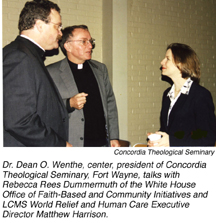Officials of President George W. Bush’s administration commended Synod human-care work in remarks at the Jan. 19 inauguration of the new deaconess  program at Concordia Theological Seminary, Fort Wayne.
program at Concordia Theological Seminary, Fort Wayne.
“The President is interested in results as they help poor people,” said Tim Goeglein, a Missouri Synod Lutheran and Fort Wayne native who serves as deputy director of the White House Office of Public Liaison.
Goeglein’s address previewed what the President later said in his State of the Union Address. “He (Bush) is not going to exclude an entire class of faith-based organizations because they happen to have a cross or star of David on the wall,” Goeglein said.
Rebecca Rees Dummermuth, associate director for legal affairs in the White House Office of Faith-Based and Community Initiatives (FBCI), said the “wide range of services” provided by LCMS ministries and the new deaconess program “make abundantly clear that you are among those the President refers to as the neighborhood healers and social entrepreneurs of our country — those who are filling needs that the government along cannot fill.”
One goal of the FBCI office, Dummermuth said, is to “level the playing field” in making government funds more accessible to faith-based organizations that help hurting Americans.
The church serving people in need was the focus of the Jan. 19 inaugural event, which was co-sponsored by the seminary and LCMS World Relief and Human Care. About 170 people took part, including U.S. Rep. Mark Souder of Indiana, LCMS Indiana District President Daniel May and seminary officials.
“This is a historic moment for the seminary as women begin to study Lutheran theology and prepare to serve the church through diakonia, an integral and vital part of the church’s mission of mercy and compassion in the clear name of Jesus,” said Rev. Matthew Harrison, LCMS World Relief and Human Care executive director, and a keynote speaker.
A total of 75 women are enrolled in three LCMS deaconess programs, including 12 at Fort Wayne, and others at Concordia University, River Forest, Ill., and Concordia Seminary, St. Louis.
This is “the highest number ever,” said Deaconess Kristin Wassilak, director of the River Forest program and chair of the LCMS World Relief and Human Care Deaconess Task Force, who delivered the plenary address.
Wassilak urged congregations to recognize “that mercy and care is an essential mission of the church” and to tap the services of “at least 15 deaconesses available for calls.”
Posted Jan. 30, 2004




